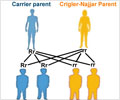While mad cow disease has been thought to be a foodborne disease for years, a new study has shown that a genetic mutation also causes it.
A new study has shown that a genetic mutation seems to cause mad cow disease.
"We now know it's also in the genes of cattle," said Juergen A. Richt, Regents Distinguished Professor of Diagnostic Medicine and Pathobiology at Kansas State University's College of Veterinary Medicine.The researchers have found that a genetic mutation within a gene called Prion Protein Gene can cause mad cow disease, scientifically known as bovine spongiform encephalopathy (BSE).
Prion proteins are proteins expressed abundantly in the brain and immune cells of mammals.
This is the first time that a study has revealed that a 10-year-old cow from Alabama with an atypical form of mad cow disease had the same type of prion protein gene mutation as found in human patients with the genetic form of Creutzfeldt-Jakob disease, also called genetic CJD for short.
"Our findings that there is a genetic component to BSE are significant because they tell you we can have this disease everywhere in the world, even in so-called BSE-free countries," Richt said.
He said that mad cow disease caused by genetics was extremely rare.
Advertisement
The researcher said that the advantage of knowing that mad cow disease has a genetic component is that it offers ways of stamping out the disease through selective breeding and culling of genetically affected animals.
Advertisement
"Genetic BSE we can combat. We have submitted a patent for a test system that can assess all bulls and cows before they're bred to see whether they have this mutation," he said.
The study has been published online in the journal PLoS Pathogens.
Source-ANI
RAS/SK













